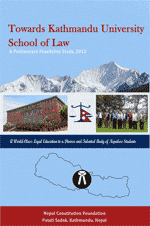Warning: Undefined variable $post in /home/bipinadh/public_html/wp-content/themes/personal/functions.php on line 281
Warning: Attempt to read property "ID" on null in /home/bipinadh/public_html/wp-content/themes/personal/functions.php on line 281
Warning: Undefined variable $pinterest_icon in /home/bipinadh/public_html/wp-content/themes/personal/functions.php on line 430
Under a compromise brokered between the major parties and the CPN (Maoist), the Constituent Assembly has finally passed the Interim Constitution Fifth Amendment Bill 2008.
The present amendment to the interim constitution tries to revert to some basic notions of the constitutional law compromised by the framers of the constitution last year. Also described as the ‘imported’ constitution, it had given in these basic notions of constitutionalism in order to bring certain objectionable changes in the fundamental law of the land. These changes (including attempts at virtual elimination of the opposition in the House) were not otherwise possible under the erstwhile Constitution of the Kingdom of Nepal 1990.
Some irksome provisions that were to be thrown out from the erstwhile Constitution were the provisions regarding the formation of the simple majority government only on the basis of elections; the constitutional prohibition on granting of Nepali citizenship en masse and without papers of entitlement; the constitutional status of the Supreme Court, the provision as to constitutional monarchy, and withdrawing the basic structure doctrine that permeated through the Constitution as the main governing principle.
A consensus government was created to implement the transition process, and only after implementing most of the interim agenda, that the interim constitution has further been amended to make it an acceptable constitutional document.
The Fifth Amendment Act passed by the Assembly early this week re-enacts the provision of forming the subsequent governments in Nepal on majority basis – a major constitutional departure from the three-year old tradition of moving on the basis of consensus politics. The amendment also re-establishes the prime-ministerial system that had a number of flaws till now. It provides that the president shall be elected by the majority in the Assembly – failing consensus among all parties. It sets provision for the opposition party and makes opposition leader a member of the Constitutional Council – which has the responsibility for important state appointments.
The Amendment Act states that the vice-president, assembly chairman, deputy chairman and the prime minister will be chosen on the basis of political understanding. And if such understanding is not forthcoming, they shall be elected by a simple majority. The amendment states for the first time that the prime minister will have to tender his resignation to the President – ending the confusion on this matter under the Interim Constitution before the present Amendment.
The Act states that the Prime Minister can be removed from office through a simple majority in the Constituent Assembly whereas the President and the Vice-President can only be removed by impeachment only by two thirds majority.
The Amendment Act provides for a special committee for integration and rehabilitation of Maoist combatants and management of their arms within six months. It scraps the appendixes from the Constitution that mentioned the names of the members of the interim parliament. It also provides that the Nepal Army will be made national in character and it will be made inclusive in nature. Similarly, the Assembly has rejected by the two-thirds majority the Nepali Congress proposal to add a constitutional provision for the presence of the leader of the opposition in the National Security Council which oversees national security and defense related matters.
The Madhesi parties which hold over 80 seats in the Assembly of 601 persons, were absent in the Assembly on July 14 meeting. They were able to block the Assembly for around ten times since June 26, when the government introduced the Bill in the House for the first time on the ground that the instrument failed to address their demands, among which was the establishment of an autonomous region of Madhes in the southern lowlands of Nepal. They maintained that the Bill was incomplete and against the spirit of the February 28 agreement creating a fully autonomous Madhes state that would also enjoy the right to self-determination.
To respond to their demands, and without narrowing down the choices before the Assembly, a revised provision in the supplementary bill to article 138 of the Constitution, had stated that Nepal will become a federal democratic country with various autonomous states accepting the desire of the Madhesi people for autonomy and the aspirations of various other communities such as the indigenous and the backward among others. While stating that the country’s sovereignty, unity and integrity will remain sacrosanct, the bill also stated that the Assembly will decide on the number of federal states to be formed, their borders and power-sharing.
As such, the incomplete Constituent Assembly meeting with the absence of the Madhesi parliamentarians belonging to five separate parties numbering 449 out of total 601 members – finally passed the measure. Of the total 449 members present, 442 Assembly members voted for the measure and the rest belonging to the Nepal Workers Peasants’ Party (4), Federal Democratic National Front (2) and Nepah National Party (1) voted against it. Additionally, the 14 amendment proposals on over fifty different constitutional provisions tabled at the House by 13 fringe parties were also rejected.
With the latest constitutional amendment, the obstructions to form a new majoritarian government (removable by simple majority in the Assembly), elect a president, a vice-president and chairman of the Constituent Assembly and to proceed ahead with the drafting of a new constitution have been cleared. Although these changes have been enacted only because the Maoists are about to form the government, and many external stakeholders believe that they need to be contained in the exercise of power, it is good for the country to remain committed to the notions of constitutionalism.
lawyers_inc_nepal@yahoo.com

